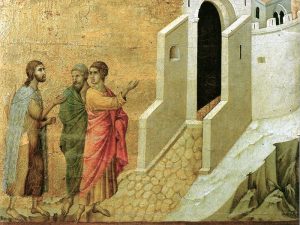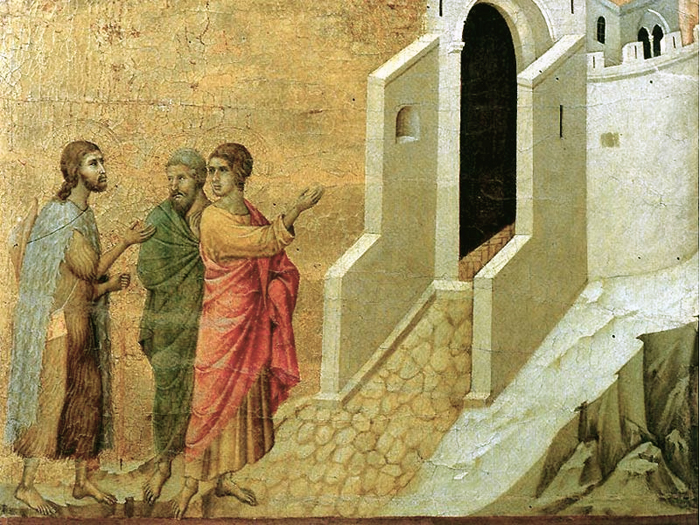Everything is Different
Third Sunday of Easter (A)
click here for readings
 |
| Jesus and the disciples on the road to Emmaus |
There is a Greek word that is largely unfamiliar to most Christians today but very important to the life of the Church: kerygma. It means “preaching.” Specifically in a Christian context it means preaching the core message of the gospel.
This is what St. Peter preaches in this Sunday’s first reading from the Acts of the Apostles. Jesus is the Son of God. You condemned Him and killed Him. But God raised Him from the dead. We are witnesses to this. Repent and believe and you, too, will share in eternal life. Persist in your unbelief and you will be lost. It’s the gospel in a nutshell.
It’s a story that is so familiar to Christians that we can take it for granted. We can forget how radical a story it is. It’s a game changer of eternal proportions. Here’s why.
If Jesus Christ truly rose from the dead, then everything is different.
It changes everything. It means that miracles are real. It means that there exists something outside of the natural world, and that “something” has broken through into the natural world. It means that Jesus is not just a good man. It means that Jesus is not just some crazy person with a God complex. It means that He is more than a teacher or a guru. It means that he is genuinely of God, with God, and is God. It means we have to take Jesus seriously.
We have to take Him seriously when He says, “I am the way, the truth and the life.”
We have to take Him seriously when He says, “No one can come to the Father except through me.”
We have to take Him seriously when He says, “Love God with all your heart, all your soul and all your mind, and love your neighbor as yourself.”
We have to take Him seriously when He says, “This is my body, which will be given up for you,” and “Unless you eat my flesh and drink my blood, you have no life within you.”
We have to take Jesus, and the whole idea of God, the Church, heaven and hell seriously. And that makes everything different.
We are at the end of an academic year at WCU. Many of you stand at the cusp of great change. We just had our final fellowship dinner of the semester, at which we honored our graduating seniors. Leaving college means transitioning from one stage in life to another; from life as a student to life in the professional world; from someone living under your parents’ care to an independent adult. I remember when I was a senior in college. It was scary, knowing that I was entering into a new stage in my life without knowing what that would involve. A year after I graduated I was married. A year after that I became a father and bought my first house. Almost nothing in my life was the same as it was a few short years before. I couldn’t have imagined then what my life now would be like.
If graduating from college is a big and scary transition for us, imagine what Jesus’ disciples felt after that first Easter. We get a glimpse in this week’s gospel account of the disciples on the road to Emmaus, a village a few miles outside of Jerusalem. They are distressed and confused. Jesus, whom they believed to be the Messiah, had died on the cross and was buried. They thought it was the end. But now people are saying He has risen from the dead. They have seen Him! Can this be true? What does this mean?
A man joins them. It is Jesus, but they do not recognize Him. He hides His identity from them. Instead He speaks to them of the scriptures and shows how everything in the Old Testament indicates that the Messiah should suffer and die and rise again from the dead. The gospel says that their “hearts were burning” within them as they listened to His words. Then He ate with them. He took bread, blessed it, broke it, and gave it to them. It is only then that they recognized Christ, “in the breaking of the bread.”
Having encountered the Risen Jesus, the gospel tells us that they “set out at once” to “tell what they had seen.” They preached the kerygma; they shared their good news. Because Jesus is truly Risen! And they knew that makes everything different.
Jesus is Risen. Like the disciples on the road to Emmaus, we encounter Him today in the breaking of the bread, in the Eucharistic feast of the Mass. Have we allowed that fact — the most important fact in the history of mankind — to make a difference in our lives? Jesus is Risen. He is the Christ. He is God. Do we take Him seriously? If not, why not?
This Easter season, I invite you to return to basics. Return to the kerygmatic core of the Christian faith. Meditate upon the Resurrection of Christ and allow it to change your life. Jesus is Risen. Everything is different.

